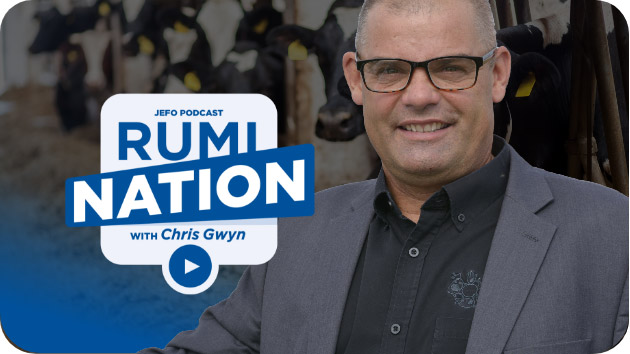RumiNation | S05 : E08
Principles for a Sustainable Dairy Industry
Brought to you by Jefo Nutrition
Share now!
Did you enjoy this episode?
Share now!
Our guest - Dr. Izabelle Teixeira
Dr. Izabelle Teixeira is an assistant professor and dairy specialist in the Department of Animal, Veterinary, and Food Sciences at the University of Idaho. Izabelle is originally from Brazil, where she received her bachelor’s degree in animal science from the Federal University of Lavras, and her master’s degree and doctor’s degree in animal science with a focus on ruminant nutrition from the São Paulo State University (UNESP). In 2010, Izabelle was hired as a professor at UNESP, Jaboticabal Campus, where she worked until 2022 before joining the University of Idaho. Her research and extension interests focus on improving our understanding of nutrient utilization by ruminants and animal efficiency to reduce the impact of ruminant production on the environment and enhance the sustainability of dairy production systems.

Timestamps & Summary
Vicki Brisson (01:56)
Can you share more about the role and importance of amino acids to support the dairy industry’s sustainability initiatives?
Dr. Izabelle Teixeira
I think balancing for amino acids is really important and can play a very important role in improving sustainability and can be a way of leveraging nutrition to enhance their sustainability. […]
Vicki Brisson (04:28)
What should [nutritionists] keep in mind when they’re formulating for individual amino acids? Or perhaps should they be looking at them as groups instead?
Dr. Izabelle Teixeira
I’m biased, right? But certainly, we have the literature support to see that when you look at individual amino acids, we don’t really fully explain the cow’s response, so the lactation performance response. So, looking at the amino acids as a group, we have a better understanding of those responses or why the cows are responding in a certain way. […]
Vicki Brisson (06:46)
Is there a reason why you looked at these specific groups of amino acids? So let’s say methionine, lysine, and histidine, and then leucine and isoleucine and you referred to the roles as well. So what might be the key differences between these groups of amino acids?
Dr. Izabelle Teixeira
There were some responses in the literature that we could use. We know that methionine plays a role in there. Lysine plays a role in there. We know that when we look at those amino acids and were, for example, decreasing the protein in the diet, but adding those amino acids, histidine was missing, and then could impair some of the response. So, it’s sort of the basis behind that first group. The other one is we also had in the literature some effects from the brain chain amino acids. So, we know that leucine plays a role in the mTOR pathway that we know is behind the milk protein synthesis. We also use the same basis for our hypothesis on the role of amino acids in milk fat synthesis. […]
Vicki Brisson (10:06)
Since you’ve done lots of work on dairy goat nutrition in the past, can you please share some of the key nutritional considerations that ruminant nutritionists should account for when they’re formulating rations for dairy goats, especially when it comes to energy, protein, and mineral requirements?
Dr. Izabelle Teixeira
Thank you for bringing that up, Vicky. For me, it was fascinating. I have always looked at small ruminants as a model, […]. But when I started working with small ruminants, especially goats, they opened so many opportunities and created so many opportunities for me. So, throughout my ten years plus experience with small ruminants, I realized some similarities that we can definitely use small ruminants as a model for […] lactating cows. […]
Vicki Brisson (15:39)
How can we successfully integrate precision livestock measurements and management tools such as precision livestock farming and digital livestock farming?
Dr. Izabelle Teixeira
I think this is a hot topic. So, pretty much everybody is pointing their eyes on precision livestock farming and there are so many tools out there that can be used, that can be applied. The industries are offering us some possibilities and I think that’s great because we need to improve. And we need to understand this precision measurement which is what is there that we can measure but also the precision management. So, how can we implement some tool that can be useful, but also it’s profitable? […]
Vicki Brisson (20:42)
What nutritional solutions are you currently investigating or looking forward to investigate as strategies to enhance the sustainability of those dairy production systems?
Dr. Izabelle Teixeira
When I arrived, I was asked to look at two main nutrients, nitrogen, and phosphorus, because that’s something important here with all the environmental concerns, and I use different strategies for them. Regarding nitrogen, we are developing a mobile-friendly web-based tool that we can refine the use of mun, so milk urea nitrogen to really understand the response of the animals […]
Vicki Brisson (27:49)
To wrap up our discussion today, can you share your three take-home messages when thinking of practical solutions to improve the dairy industry’s sustainability?
Dr. Izabelle Teixeira
I would say the first one is to look at nutrition not as specific boxes like protein or amino acids or energy but in a more interactive way. […]
The other take-home message would be to look at sustainability in a holistic way. […]
And I think the last one is […] the importance of training because you can formulate the best diet ever if you don’t have the workforce prepared to use that diet for feeding the cows in a proper way, it doesn’t matter.







